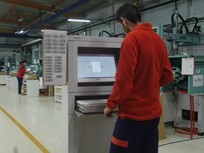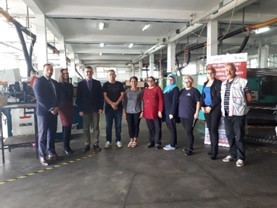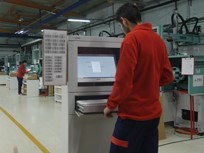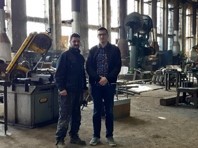Speeches Shim

Companies in Bosnia and Herzegovina (BiH) don’t always know where to turn for training and other assistance they need to expand or break into EU markets. So, when local metal processing companies reached out for help, USAID listened.
Metal manufacturing is a hyper-competitive industry in which technology and processes are constantly fine-tuned. For companies with their sights on EU markets, certifying their products and finding workers with advanced manufacturing skills are two of their biggest challenges.
“You are not going to be able to stay competitive in our industry if you aren’t continually investing in technology and people. Investing in people is investing in the future,” said one manager.
Through its Workforce and Higher Access to Markets (WHAM) project, USAID helps BiH companies meet the standards needed to conquer the European markets. Saraj-Komerc, TEM Mandeks, and STEP are just three companies that used assistance from USAID to obtain EU certification and/or upgrade the workforce. They are already showing the markers of success: expanded production, increased sales and exports, and jobs.
Saraj-Komerc (a metal processing factory in Gornji Vakuf)
Saraj-Komerc used assistance from USAID to hire and train more than 40 men and women and, ultimately, expand production and sales.
“Educated workers are key factors for production quality in the industry,” says Ensar Bukaric, STEP’s quality control director. “Thanks to the training provided in cooperation with the USAID WHAM project, we have maintained continuity in product quality and been able to honor the deadlines and shipments under contract with our business partners.”

Not only that, but the company increased exports by 11.5 percent and sales by 17.8 percent in the first half of 2019, compared with the same period of 2018. The training improved the male/female ratio too. “After this training, women are more present as workers in the metal industry, … and our factory is gaining new clients and maintaining continuous growth,” Bukarić said.
Jasmina Mujčić is one of the 21 new female employees: “In the past, I tried to get a job in this very factory, and now, thanks to the training, I have achieved my goal.”
Aida Musa, age 50, said: “At my age, it is very hard to find any job and even harder to find a good job. Thanks to the training, I finally have a job, salary, and financial stability…. It is a very good feeling to be of use in a company and society.”
TEM Mandeks exports 70 percent of its products to the EU, including electrical switches and sockets, and Smart home/hotel/parking management systems. TEM Mandeks used a USAID grant to certify the company’s new MX Automation sockets for Smart home and hotel automation (in line with EU electromagnetic compatibility, or EMC, standards). This allowed TEM Mandeks to exports these products into the EU to meet their EU customer demands. The company also hired 13 new employees, nine of which were women and young adults under age 35, and three who secured their very first job. The move has helped the company increase production and exports by 10 percent in 2019.
Among the new TEM employees is 21-year-old Marko Kožul: "Finally! A job! I don’t need to go and work abroad."

STEP (a medium-sized metal processing and construction company in Sarajevo)
STEP also used USAID WHAM grants to acquire certification required for EU markets. With USAID assistance STEP hired 11 workers, for a total of 129. STEP installs, tests, and commissions railway signaling, safety, and telecommunication devices, as well as electric and mechanical equipment in civil engineering related to railway infrastructure. Assistance helped STEP obtain certification (in BAS EN ISO 3834 and EN 1090). The bottom line is this: increased production and exports, and a more skilled workforce.
Jusuf Pandzic is a new welder at STEP. “My family has seven members and none of them are employed,” Jusuf says. “As an unskilled worker, there was no chance for me to find a stable job. The only thing I could do was irregular jobs. Finally, now that I have completed my welding training and got a job at STEP, my family has income and security.”
Amil Domjanovic is an engineer but completed a six-month training program to obtain the IWE International Welding Certificate. “Even though I graduated from the Faculty of Mechanical Engineering, I did not have the knowledge or certification to supervise or manage the production processes in accordance with European standards. Now I am a certified welding engineer. With my new title, the whole production process has improved, and the company can participate in international tenders.”

Project Background: USAID's Workforce and Higher Access to Markets (WHAM) project aims to increase the number of workplaces and revenue by advancing BiH trade integration with EU and regional markets. The focus and priority of this project is high-growth, exporting, and export-ready companies from the metal, wood, ICT, and textile/leather industries.

Comment
Make a general inquiry or suggest an improvement.